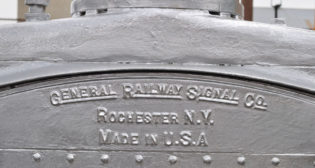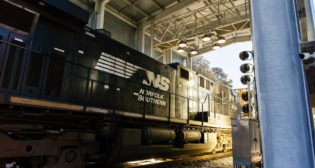
Additional rail labor agreements reached
Written by Frank N. Wilner, Capitol Hill Contributing EditorAs ascendancy of jaw-jaw over war-war is making even a partial national rail work stoppage less probable, an agreement this week between the freight railroads and their second largest labor union has further decreased such concern.
The Brotherhood of Maintenance of Way Employes (BMWE), with 27,500 members, which not long ago seemed least likely to achieve a collectively bargained settlement under provisions of the Railway Labor Act, reached an agreement with the industry’s bargaining arm, the National Carriers’ Conference Committee (NCCC), to resolve issues through binding arbitration. An identical arbitration agreement was reached with the 1,100-member shopcraft division of the International Association of Sheet Metal, Air, Rail and Transportation Workers.
On wages and work rules, the BMWE, with 27,500 members, tentatively agreed to a pattern established last year between the largest and third largest of rail unions, and subsequently agreed to by most smaller labor organizations. On health care, however, the BMWE and carriers agreed to binding arbitration. An identical tentative agreement also was reached with the shopcraft division of the International Association of Sheet Metal, Air, Rail and Transportation Workers (1,100 members).
More than 70% of the almost 145,000 unionized freight rail employees have now ratified agreements with the more than 30 freight railroads—including BNSF, CSX, Kansas City Southern, Norfolk Southern and Union Pacific—represented in bargaining by the NCCC.
Among rail labor unions whose members have ratified agreements on wages, benefits and work rules are the American Train Dispatchers Association (1,600 members); Brotherhood of Locomotive Engineers and Trainmen (27,200); Brotherhood of Railroad Signalmen (8,500); Brotherhood of Railway Carmen (11,100); the Transportation and Yardmaster divisions of the International Association of Sheet Metal, Air, Rail and Transportation Workers (44,000); National Conference of Firemen and Oilers (2,800); and Transportation Communications International Union (6,300).
Yet to reach a collectively bargained agreement on wages, benefits and work rules—all of which remain in mediation controlled by the National Mediation Board—are the International Association of Machinists and Aerospace Workers (7,600 members); International Brotherhood of Electrical Workers (6,400); and International Brotherhood of Boilermakers, Blacksmiths, Iron Ship Builders, Forgers and Helpers (600).
Bargaining between the freight railroads and their dozen labor unions began in January 2015 under provisions of the Railway Labor Act. Previous agreement provisions on wages, benefits and work rules remain in force until revised through collective bargaining, binding arbitration or congressional legislation (where collective bargaining fails). Terms of this bargaining round’s ratified agreements are not subject to renegotiation before Jan. 1, 2020.
The ratified agreements will put almost $33,000 more into the pockets of the highest-paid workers by mid-2019, and more than $16,000 into the paychecks of those in the lower wage rungs. There is not a single work rules change.
Although healthcare co-pays, deductibles and out-of-pocket maximums rise under the ratified agreements—but more slowly than medical cost inflation, and barely for those in good health—employee monthly insurance premiums are capped at the current $228.89 monthly level until at least mid-2020. By contrast, other private sector and federal workers pay significantly more. In fact, railroads will continue paying some 90% of all employee healthcare costs.
Amtrak, which negotiates separately with some dozen rail unions, has reached member-ratified agreements with conductors and clerks, and a tentative (to be ratified) agreement with locomotive engineers. Both, retroactive to Jan. 1, 2015, increase pay by almost 19% through July 2021, and cap employee healthcare contributions. Amtrak remains in collective bargaining with the BMWE and other labor organizations.



